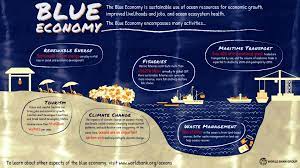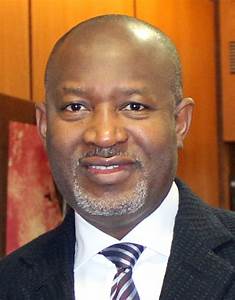Blue economy has a huge importance to national development, especially for a maritime nation. It goes beyond shipping as well as oil and gas, to encompass all the activities that involve harnessing ocean resources including fishery, renewable energy, offshore power, support network and repairs.
According to data from the Nigerian Maritime Administration and Safety Agency (NIMASA), it is estimated that Nigeria’s untapped blue economy potential is valued at $296 billion.
This shows that sustainable exploitation of resources in the blue economy can lead to job creation, improved food security, tourism and infrastructure development, and green energy, among others.
“Sustainable exploitation of the blue economy resource will not only help Nigeria to generate revenue but to create employment for Nigeria’s growing population. Nigeria now has a ministry that is focused on realising the potential of the blue economy, and the government needs to create an enabling environment for private investment to thrive,” Abdul-Kadir Ahmed, managing director/CEO of NLNG Shipping and Marine Service Limited, told BusinessDay in Lagos.
Most importantly, the blue economy can be driven effectively by private operators, but Ahmed believed that it is critical for the government to strengthen regulations and oversight functions that will ensure safety in line with international standards.
By so doing, both the government and prospective investors can look in the following five directions to tap from the opportunities in Nigeria’s blue economy.
Port development
For Nigeria to create the wealth and jobs needed to turn the economic situation of the country around, the country needs to develop new deep seaports. Developing new ports will help to create a network of modern ports that can improve the turnaround time of vessels coming to Nigeria and further help to decongest the existing ones.

Presently, there are five deep seaports that are in the planning stages, and they include Badagry Deep Seaport in Lagos, Ondo Deep Seaport in Ondo State, Ibom Deep Seaport in Akwa Ibom, Bonny Deep Seaport in Rivers State and Benin River Port in Edo State.
Badagry Port is a $2.59 billion investment already approved by the Federal Executive Council and has the potential to create about 250,000 jobs and attract foreign direct investment. It is expected to generate a total of $53.6 billion in revenue over the 45-year concession period and can help Nigeria in curbing unemployment.
While Ondo Port is driven by the state government together with private investors, Benin River Port, Bonny and Ibom Deep Seaports are being cited in the South-South region and will help to reduce the pressure in the Lagos area by opening new investment opportunities in both South-South and South-East regions.
Enforce Cabotage Act
The demise of the Nigerian National Shipping Line in the 90s took away ship-owning status from Nigeria, leaving the country’s shipping business in the hands of foreigners.
The Nigerian ship charter market is estimated to be worth at least $10 billion annually, the majority of which is handled by foreign-owned ships. To help Nigerian shipowners gain hold of the business and reduce the level of job losses and capital flight, the Federal Government came up with the Coastal and Inland Shipping (Cabotage) Act 2003.
Cabotage Act gave Nigerians the exclusive right to control locally generated seaborne trade, yet the country’s seaborne trade is dominated by foreign ship owners.
However, the Act also allows the minister of transport to approve waivers that allow for the engagement of foreign vessels in situations where Nigerian-owned ships do not meet the requirements for a particular business.
Industry analysts blamed the indiscriminate issuing of waivers by past ministers of transport for foreign domination of the nation’s shipping business. Therefore, for the Cabotage Act to favour Nigerians, the minister of marine and blue economy needs to be mindful of the type of waivers to grant alien ships.
Regulate ocean fishing business
Africa’s most populous nation has been battling illegal, unreported, and unregulated fishing activities mostly perpetrated by foreign fishermen. As a result, it is estimated that Nigeria loses over $70 million in revenue with its attendant jobs to illegal and unregulated fishing.
Agreeing with this, Olisa Agbakoba, a renowned maritime lawyer and senior advocate of Nigeria, said that illegal exploration of Nigerian waters is huge and can be estimated at between $600 million and $800 million yearly.
Agbakoba said that vessels from China, the European Union, and Belize are notable for exploiting Nigerian waters illegally.
To put an end to revenue and job losses from the illegal exploitation of Nigeria’s waters, Agbakoba said Nigeria must enact the Maritime Zone Bill to cater to the aquatic resources currently exploited.
Jude Okenwa, a maritime consultant, said the Federal Government through the NIMASA must engage the National Assembly to review relevant maritime laws that would have some punitive clauses on foreign trawlers that engage in illegal fishing activities.
Disburse Cabotage Fund
The enactment of the Cabotage Act 20 years ago led to the creation of the Cabotage Vessel Financing Fund. The intervention fund is derived from a 2 percent contribution made by indigenous shipowners on the value of any Cabotage trade embarked on.
It was targeted at providing financial assistance and ship loans to Nigerian shipowners operating in domestic coastal shipping to buy new vessels that would take control of the nation’s Cabotage trade.
Twenty years later, the fund is yet to be disbursed to deserving shipowners, which was why President Muhammadu Buhari approved the disbursement of the Cabotage fund currently at over $350 million and N16 billion.
Though NIMASA started the preliminary arrangements for the disbursement before the termination of the last administration, the fund is still far from being disbursed.
This is why stakeholders believed that the current government needs to be decisive in developing shipping in a way that hundreds of thousands of jobs would be created for Nigerians in the shipping sector.
Grow ship repair business
Ship repair is another aspect of the blue economy that Nigeria can tap from to grow the economy and create jobs. Developing a ship repair sub-industry that will support the country’s shipping business will save Nigeria about N300 billion yearly capital flight.
At present, there are no serious dry-docking facilities in Nigeria, which is why shipowners go to countries like Singapore, South Africa, Senegal, and Namibia, among others, to repair their vessels in line with the international law as specified by the International Maritime Organization.
The statutory dry-docking is an ecosystem that involves repair firms, equipment manufacturers, technicians, and classification societies. These societies must certify that the repair was in line with international standards, which will take Nigeria a long time to achieve.
For now, Nigeria can start with the basic repair of smaller vessels, marine crafts, tugboats and others in such a way that it will create jobs and conserve scarce dollars.
Truly, Nigeria’s maritime sector is enormous and capable of generating over N7 trillion annually and creating about 40 million jobs, according to Bashir Jamoh, director general of NIMASA.
Therefore, there is no better time than now to advance policies that will help investors tap into the massive economic opportunities inherent in the sector.























